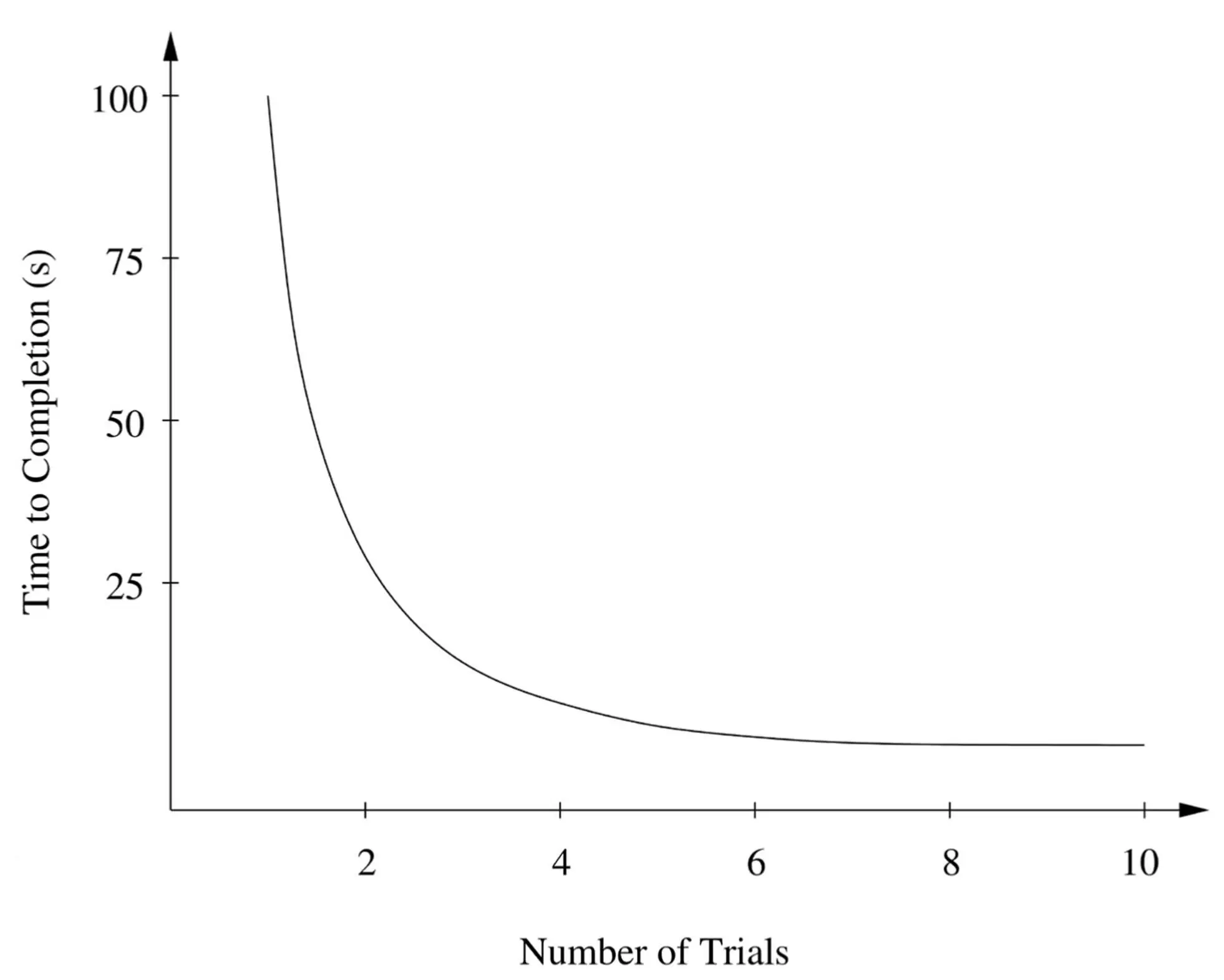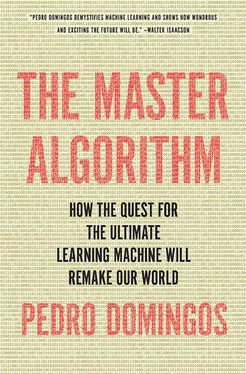Notice how reinforcement learners face the same exploration-exploitation dilemma we met in Chapter 5: to maximize your rewards, you’ll naturally want to always pick the action leading to the highest-value state, but that prevents you from potentially discovering even higher rewards elsewhere. Reinforcement learners solve this by sometimes choosing the best action and sometimes a random one. (The brain even seems to have a “noise generator” for this purpose.) Early on, when there’s much to learn, it makes sense to explore a lot. Once you know the territory, it’s best to concentrate on exploiting it. That’s what humans do over their lifetimes: children explore, and adults exploit (except for scientists, who are eternal children). Children’s play is a lot more serious than it looks; if evolution made a creature that is helpless and a heavy burden on its parents for the first several years of its life, that extravagant cost must be for the sake of an even bigger benefit. In effect, reinforcement learning is a kind of speeded-up evolution-trying, discarding, and refining actions within a single lifetime instead of over generations-and by that standard it’s extremely efficient.
Research on reinforcement learning started in earnest in the early 1980s, with the work of Rich Sutton and Andy Barto at the University of Massachusetts. They felt that learning depends crucially on interacting with the environment, but supervised algorithms didn’t capture this, and they found inspiration instead in the psychology of animal learning. Sutton went on to become the leading proponent of reinforcement learning. Another key step happened in 1989, when Chris Watkins at Cambridge, initially motivated by his experimental observations of children’s learning, arrived at the modern formulation of reinforcement learning as optimal control in an unknown environment.
Reinforcement learners as we’ve seen them so far are not very realistic, however, because they don’t know what to do in a state unless they’ve been there before, and in the real world no two situations are ever exactly alike. We need to be able to generalize from previously visited states to new ones. Luckily, we already know how to do that: all we have to do is wrap reinforcement learning around one of the supervised learners we’ve met before, such as a multilayer perceptron. The neural network’s job is now to predict the value of a state, and the error signal for backpropagation is the difference between the predicted and observed values. There’s a problem, however. In supervised learning the target value for a state is always the same, but in reinforcement learning, it keeps changing as a consequence of updates to nearby states. As a result, reinforcement learning with generalization often fails to settle on a stable solution, unless the inner learner is something very simple, like a linear function. Nevertheless, reinforcement learning with neural networks has had some notable successes. An early one was a human-level backgammon player. More recently, a reinforcement learner from DeepMind, a London-based startup, beat an expert human player at Pong and other simple arcade games. It used a deep network to predict actions’ values from the console screen’s raw pixels. With its end-to-end vision, learning, and control, the system bore at least a passing resemblance to an artificial brain. This may help explain why Google paid half a billion dollars for DeepMind, a company with no products, no revenues, and few employees.
Gaming aside, researchers have used reinforcement learning to balance poles, control stick-figure gymnasts, park cars backward, fly helicopters upside down, manage automated telephone dialogues, assign channels in cell phone networks, dispatch elevators, schedule space-shuttle cargo loading, and much else. Reinforcement learning has also influenced psychology and neuroscience. The brain does it, using the neurotransmitter dopamine to propagate differences between expected and actual rewards. Reinforcement learning explains Pavlovian conditioning, but unlike behaviorism, it allows animals to have internal mental states. Foraging bees use it, as do mice finding cheese in mazes. Your daily life is a stream of little-noticed miracles made possible in part by reinforcement learning. You get up, get dressed, eat breakfast, and drive to work, all the while thinking about something else. Below the surface, reinforcement learning continually orchestrates and fine-tunes this prodigious symphony of motion. Snippets of reinforcement learning, also known as habits, make up most of what you do. You feel hungry, walk to the fridge, and grab a snack. As Charles Duhigg shows in The Power of Habit , understanding and controlling this cycle of cue, routine, and reward is key to success, not just for individuals but for businesses and even whole societies.
Of reinforcement learning’s founders, Rich Sutton is the most gung ho. For him, reinforcement learning is the Master Algorithm and solving it is tantamount to solving AI. Chris Watkins, on the other hand, is dissatisfied. He sees many things children can do that reinforcement learners can’t: solve problems, solve them better after a few attempts, make plans, acquire increasingly abstract knowledge. Luckily, we also have learning algorithms for these higher-level abilities, the most important of which is chunking.
Practice makes perfect
To learn is to get better with practice. You may barely remember it now, but learning to tie your shoelaces was really hard. At first you couldn’t do it at all, despite your five years of age. Then your laces probably came undone faster than you could tie them. But little by little you learned to tie them faster and better until it became completely automatic. The same happens with lots of other things, like crawling, walking, running, riding a bike, and driving a car; reading, writing, and arithmetic; playing an instrument and practicing a sport; cooking and using a computer. Ironically, you learn the most when it’s most painful: early on, when every step is difficult, you keep failing, and even when you succeed, the results are not very pretty. After you’ve mastered your golf swing or tennis serve, you can spend years perfecting it, but all those years make less difference than the first few weeks did. You get better with practice, but not at a constant rate: at first you improve quickly, then not so quickly, then very slowly. Whether it’s playing games or the guitar, the curve of performance improvement over time-how well you do something or how long it takes you to do it-has a very specific form:

This type of curve is called a power law, because performance varies as time raised to some negative power. For example, in the figure above, time to completion is proportional to the number of trials raised to minus two (or equivalently, one over the number of trials squared). Pretty much every human skill follows a power law, with different powers for different skills. (In contrast, Windows never gets faster with practice-something for Microsoft to work on.)
In 1979, Allen Newell and Paul Rosenbloom started wondering what could be the reason for this so-called power law of practice. Newell was one of the founders of AI and a leading cognitive psychologist, and Rosenbloom was one of his graduate students at Carnegie Mellon University. At the time, none of the existing models of practice could explain the power law. Newell and Rosenbloom suspected it might have something to do with chunking, a concept from the psychology of perception and memory. We perceive and remember things in chunks, and we can only hold so many chunks in short-term memory at any given time (seven plus or minus two, according to the classic paper by George Miller). Crucially, grouping things into chunks allows us to process much more information than we otherwise could. That’s why telephone numbers have hyphens: 1-723-458-3897 is much easier to remember than 17234583897. Herbert Simon, Newell’s longtime collaborator and AI cofounder, had earlier found that the main difference between novice and expert chess players is that novices perceive chess positions one piece at a time while experts see larger patterns involving multiple pieces. Getting better at chess mainly involves acquiring more and larger such chunks. Newell and Rosenbloom hypothesized that a similar process is at work in all skill acquisition, not just chess.
Читать дальше













